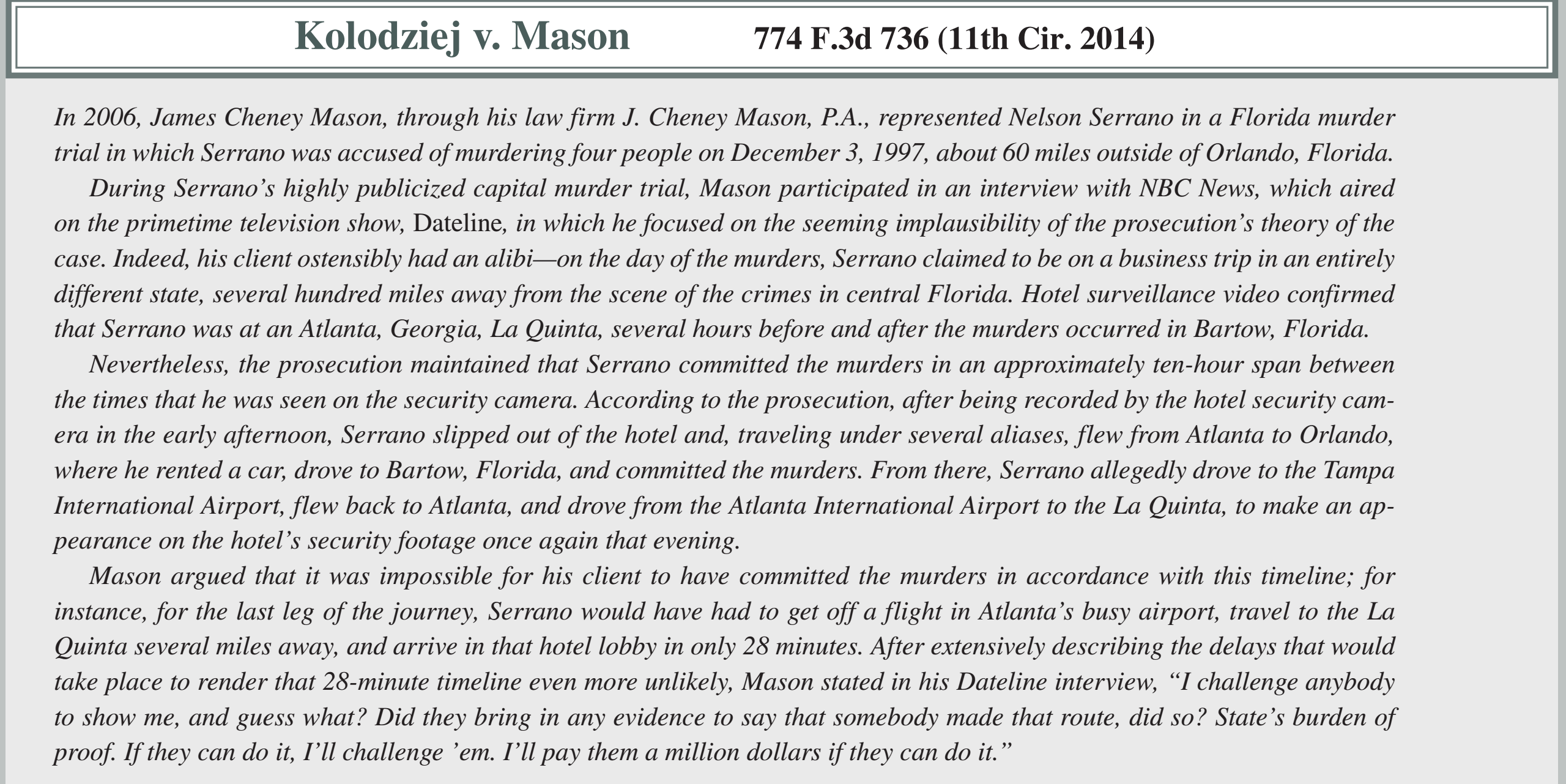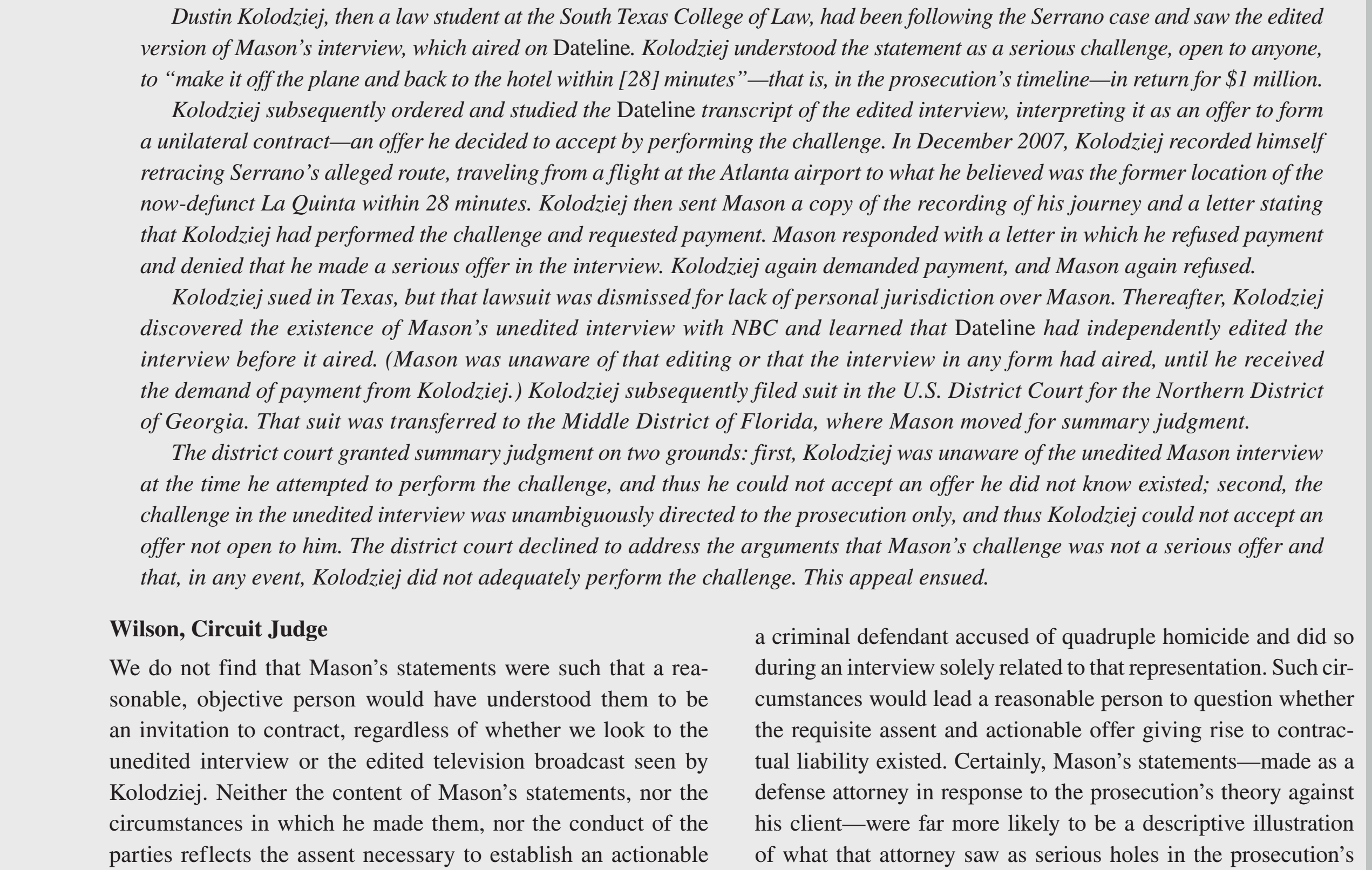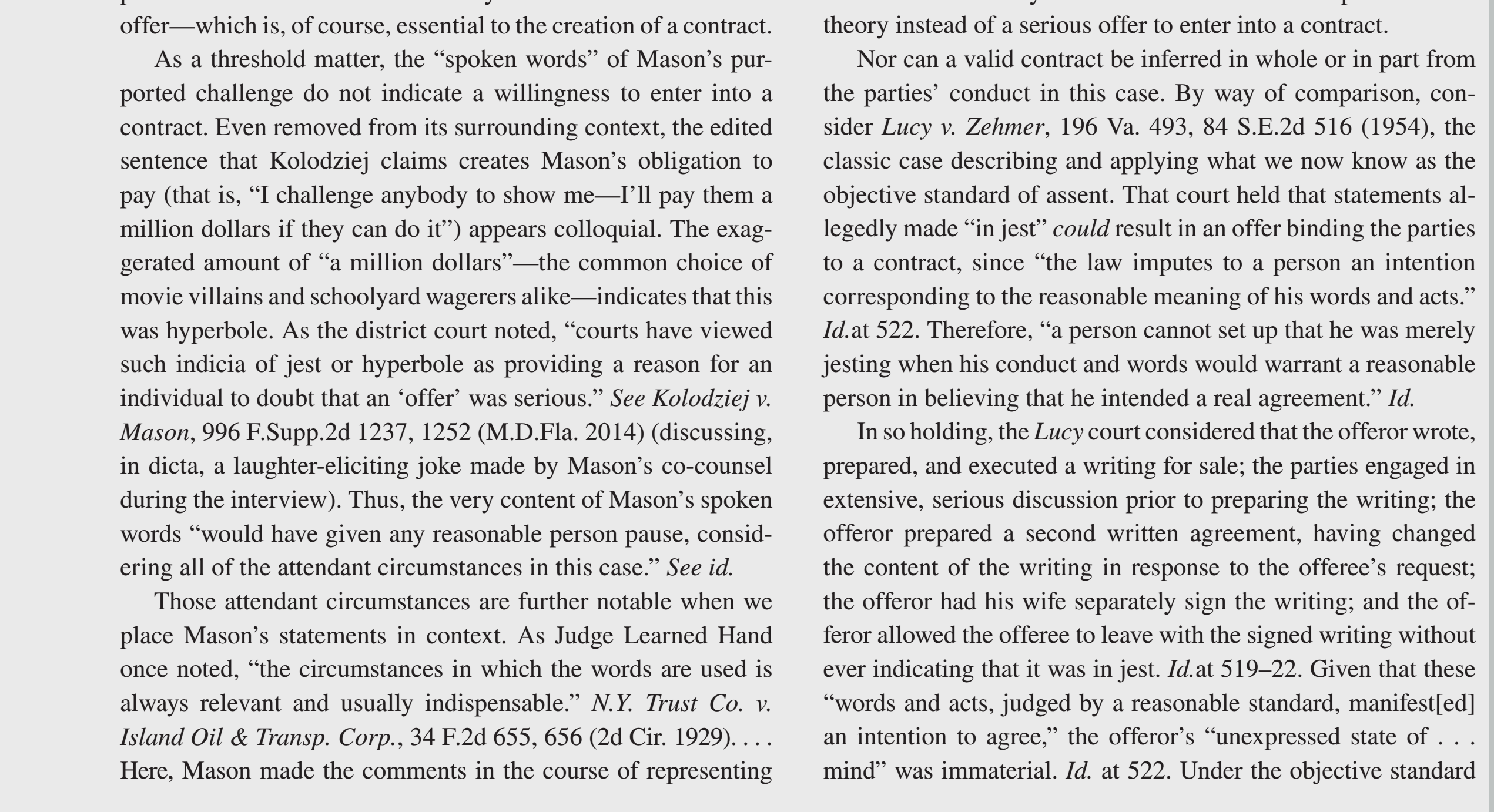




This is the case of Kolodziej v. Mason
Question: please summarize and include
the following;
Fact:
Judgment:
Issue:
Holding:
General Analysis
Applied Analysis:
Kolodziej v. Mason 774 F.3d 736 (11th Cir. 2014) In 2006, James Cheney Mason, through his law firm J. Cheney Mason, P.A., represented Nelson Serrano in a Florida murder trial in which Serrano was accused of murdering four people on December 3, 1997, about 60 miles outside of Orlando, Florida. During Serrano's highly publicized capital murder trial, Mason participated in an interview with NBC News, which aired on the primetime television show, Dateline, in which he focused on the seeming implausibility of the prosecution's theory of the case. Indeed, his client ostensibly had an alibi-on the day of the murders, Serrano claimed to be on a business trip in an entirely different state, several hundred miles away from the scene of the crimes in central Florida. Hotel surveillance video confirmed that Serrano was at an Atlanta, Georgia, La Quinta, several hours before and after the murders occurred in Bartow, Florida. Nevertheless, the prosecution maintained that Serrano committed the murders in an approximately ten-hour span between the times that he was seen on the security camera. According to the prosecution, after being recorded by the hotel security cam- era in the early afternoon, Serrano slipped out of the hotel and, traveling under several aliases, flew from Atlanta to Orlando, where he rented a car, drove to Bartow, Florida, and committed the murders. From there, Serrano allegedly drove to the Tampa International Airport, flew back to Atlanta, and drove from the Atlanta International Airport to the La Quinta, to make an ap- pearance on the hotel's security footage once again that evening. Mason argued that it was impossible for his client to have committed the murders in accordance with this timeline; for instance, for the last leg of the journey, Serrano would have had to get off a flight in Atlanta's busy airport, travel to the La Quinta several miles away, and arrive in that hotel lobby in only 28 minutes. After extensively describing the delays that would take place to render that 28-minute timeline even more unlikely, Mason stated in his Dateline interview, "I challenge anybody to show me, and guess what? Did they bring in any evidence to say that somebody made that route, did so? State's burden of proof. If they can do it, I'll challenge 'em. I'll pay them a million dollars if they can do it."Dustin Kolodziej, then a law student at the South Texas College of Law, had been following the Serrano case and saw the edited version of Mason 's interview, which aired on Dateline. Kolodziej understood the statement as a serious challenge, open to anyone, to \"make it off the plane and back to the hotel within [28] minutes \"that is, in the prosecution's timelinein return for $1 million. Kolodziej subsequently ordered and studied the Dateline transcript of the edited interview, interpreting it as an offer to form a unilateral contractan o'er he decided to accept by performing the challenge. In December 2007, Kolodziej recorded himself retracing Serrano 's alleged route, traveling from a ight at the Atlanta airport to what he believed was the former location of the now-defunct La Quinta within 28 minutes. Kolodziej then sent Mason a copy of the recording of his journey and a letter stating that Kolodziej had performed the challenge and requested payment. Mason responded with a letter in which he refused payment and denied that he made a serious offer in the interview. Kolodziej again demanded payment, and Mason again refused. Kolodziej sued in Texas, but that lawsuit was dismissed for lack of personal jurisdiction over Mason. Thereafter, Kolodziej discovered the existence of Mason's unedited interview with NBC and learned that Dateline had independently edited the interview before it aired. (Mason was unaware of that editing or that the interview in any form had aired, until he received the demand of payment from Kolodziej. ) Kolodziej subsequently filed suit in the US. District Court for the Northern District of Georgia. That suit was transferred to the Middle District of Florida, where Mason moved for summary judgment. The district court granted summary judgment on two grounds: rst, Kolodziej was unaware of the unedited Mason interview at the time he attempted to perform the challenge, and thus he could not accept an oer he did not know existed; second, the challenge in the unedited interview was unambiguously directed to the prosecution only, and thus Kolodziej could not accept an o'er not open to him. The district court declined to address the arguments that Mason's challenge was not a serious o'er and that, in any event, Kolodziej did not adequately perform the challenge. This appeal ensued. Wilson, Circuit Judge We do not find that Mason's statements were such that a rea- sonable, objective person would have understood them to be an invitation to contract, regardless of whether we look to the unedited interview or the edited television broadcast seen by Kolodziej. Neither the content of Mason's statements, nor the circumstances in which he made them, nor the conduct of the parties reects the assent necessary to establish an actionable a criminal defendant accused of quadruple homicide and did so during an interview solely related to that representation. Such cir cumstances would lead a reasonable person to question whether the requisite assent and actionable offer giving rise to contrac- tual liability existed. Certainly, Mason's statementsmade as a defense attorney in response to the prosecution's theory against his clientwere far more likely to be a descriptive illustration of what that attorney saw as serious holes in the prosecution's J. u offerwhich is, of course, essential to the creation of a contract. As a threshold matter, the \"spoken words\" of Mason's pur- ported challenge do not indicate a willingness to enter into a contract. Even removed from its surrounding context, the edited sentence that Kolodziej claims creates Mason's obligation to pay (that is, \"I challenge anybody to show meI'll pay them a million dollars if they can do it\") appears colloquial. The exag- gerated amount of \"a million dollars\"the common choice of movie villains and schoolyard wagerers alikeindicates that this was hyperbole. As the district court noted, \"courts have viewed such indicia of jest or hyperbole as providing a reason for an individual to doubt that an 'offer' was serious.\" See Kolodziej v. Mason, 996 F.Supp.2d 1237, 1252 (M.D.Fla. 2014) (discussing, in dicta, a laughter-eliciting joke made by Mason's cocounsel during the interview). Thus, the very content of Mason's spoken words \"would have given any reasonable person pause, consid- ering all of the attendant circumstances in this case.\" See id. Those attendant circumstances are further notable when we place Mason's statements in context. As Judge Learned Hand once noted, \"the circumstances in which the words are used is always relevant and usually indispensable.\" N.Y. Trust Co. v. Island Oil & Transp. Corp., 34 F.2d 655, 656 (2d Cir. 1929). . . . Here, Mason made the comments in the course of representing .4 1 theory instead of a serious offer to enter into a contract. Nor can a valid contract be inferred in whole or in part from the parties' conduct in this case. By way of comparison, con- sider Lucy v. Zehmer, 196 Va. 493, 84 S.E.2d 516 (1954), the classic case describing and applying what we now know as the objective standard of assent. That court held that statements al- legedly made \"in jest\" could result in an offer binding the parties to a contract, since \"the law imputes to a person an intention corresponding to the reasonable meaning of his words and acts.\" Id. at 522. Therefore, \"a person cannot set up that he was merely jesting when his conduct and words would warrant a reasonable person in believing that he intended a real agreement.\" Id. In so holding, the Lucy court considered that the offeror wrote, prepared, and executed a writing for sale; the parties engaged in extensive, serious discussion prior to preparing the writing; the offeror prepared a second written agreement, having changed the content of the writing in response to the offeree's request; the offeror had his wife separately sign the writing; and the of- feror allowed the offeree to leave with the signed writing without ever indicating that it was in jest. Id. at 5 1922. Given that these \"words and acts, judged by a reasonable standard, manifest[ed] an intention to agree,\" the offeror's \"unexpressed state of . . . mind\" was immaterial. Id. at 522. Under the objective standard of assent, the Lucy court found that the parties had formed a con- tract. See id. Applying the objective standard here leads us to the real million-dollar question: \"What did the party say and do?\" Here, it is what both parties did not say and did not do that clearly distin- guishes this case from those cases where an enforceable contract was formed. Mason did not engage in any discussion regarding his statements to NBC with Kolodziej, and, prior to Kolodziej demanding payment, there was no contact or communication be- tween the parties. Mason neither confirmed that he made an offer nor asserted that the offer was serious. Mason did not have the payment set aside in escrow; nor had he ever declared that he had money set aside in case someone proved him wrong. Mason had not made his career out of the contention that the prosecution's case was implausible; nor did he make the statements in a com- mercial context for the \"obvious purpose of advertising or pro- moting [his] goods or business.\" He did not create or promote the video that included his statement, nor did he increase the amount at issue. He did not, nor did the show include, any information to contact Mason about the challenge. Simply put, Mason's conduct lacks any indicia of assent to contract. In fact, none of Mason's surrounding commentaryeither in the unedited original interview or in the edited television broadcastgave the slightest indication that his statement was anything other than a figure of speech. In the course of repre- senting his client, Mason merely used a rhetorical expression to the case, Serrano, using an alias, was seated in the coach sec- tion of an aircraft loaded with over one hundred other passen- gers. Kolodziej, however, purchased a front row aisle seat in first class and started the twentyeightminute countdown from that prime location. Comparably, Kolodziej did not finish his performance in the La Quinta lobby; rather, Kolodziej ended the challenge at an EconoLodge, which, based on anecdotal infor- mation, he believed was the former location of the La Quinta in which Serrano stayed. We highlight these differences not to comment as to whether Kolodziej adequately performed the challengewhich the par- ties dispute for a multitude of additional reasonsbut instead to illustrate the lack of definiteness and specicity in any purported offer (and absence of mutual assent thereto). It is challenging to point to anything Mason said or did that evinces a \"display of willingness to enter into a contract on specified terms, made in a way that would lead a reasonable person to understand that an acceptance, having been sought, will result in a binding con- tract.\" See Black's Law Dictionary 1189 (9th ed. 2009) (defin- ing \"offer\" in contract law). Therefore, we conclude that Mason did not manifest the requisite willingness to contract through his words or conduct, and no amount of subsequent effort by Kolodziej could turn Mason's statements into an actionable offer. *** Just as people are free to contract, they are also free from con- raise questions as to the prosecution's case. We could just as eas- ily substitute a comparable idiom such as \"I'll eat my hat\" or \"I'll be a monkey's uncle\" into Mason's interview in the place of \"I'll pay them a million dollars,\" and the outcome would be the same. We would not be inclined to make him either consume his headwear or assume a simian relationship were he to be proven wrong; nor will we make him pay one million dollars here. Additionally, an enforceable contract requires mutual assent as to sufficiently definite essential terms. . . . Here, even the proper starting and ending points for Mason's purported chal- lenge were unspecified and indefinite; Kolodziej had to specu- late and decide for himself what constituted the essential terms of the challenge. For instance, in the prosecution's theory of tract, and we find it neither prudent nor permissible to impose contractual liability for offhand remarks or grandstanding. Nor would it be advisable to scrutinize a defense attorney's hyper- bolic commentary for a hidden contractual agenda, particularly when that commentary concerns the substantial protections in place for criminal defendants. Having considered the content of Mason's statements, the context in which they were made, and the conduct of the parties, we do not find it reasonable to con- clude that Mason assented to enter into a contract with anyone for one million dollars. We afrm the district court's judgment in favor of Mason. . . . AFFIRMED
















